- Home
- Patricia MacLachlan
My Father's Words Page 2
My Father's Words Read online
Page 2
And he had left all those words for me.
When I went up the stairs to bed, I looked in Finn’s room. The desk lamp was on. Finn was sleeping.
Before I turned off the light I saw dozens of folded papers scattered across his desk. I opened one. Then another.
All notes to Finn from Luke.
Finn,
Let’s go fishing next week. I have a fishing pole for you.
Luke
I didn’t read any of the other notes. They were for Finn.
I left the light on. I left the notes where they were.
Luke had not only left words for me. He had left them for Finn, too.
Chapter 4
Emma
When I got up in the morning, my mother had already gone to class. Luke was sitting in the kitchen, eating cereal. Finn was next to him, eating toast and jam.
“Have you moved in?” I asked Luke.
“In a way,” said Luke. “I called the dog shelter, and we’ll go today to volunteer. I told Finn.”
“I have my books,” said Finn. “To read to the dogs.”
I could tell he had a question to ask.
“Will this be fun?” he asked Luke.
Luke looked quickly at me. “I don’t know if it will be fun, Finn. But it will make some sad dog happier,” said Luke.
Finn nodded.
What Luke said could have been said by my father.
Finn opened the book at the top of his pile.
“Do you think one of the dogs will like The Year at Maple Hill Farm?” he asked.
My father had given Finn that book for a long-ago birthday. It was Finn’s favorite. He loved the passing of seasons and how the animals lived.
I couldn’t think of an answer.
But Luke had one.
“Yes. But mostly the dogs will like you,” he said. “Get a bag for your books. We have to go soon.”
Finn ran upstairs.
“I haven’t had breakfast,” I said.
Luke handed me a piece of Finn’s toast and jam. I looked sideways at him, about to say something about his notes to Finn. But I didn’t.
Those words belonged to them.
When we opened the door to the dog shelter we were surrounded by happy dogs. Little dogs ran out to be petted. A refined poodle looked over the counter.
“Thank you for coming!” said a woman. “I’m Martha, and some of these happy dogs are only here for a time while their families are on vacation. They miss them, but not too much! We board some dogs. We rescue some dogs.”
The poodle came out from behind the counter and walked up to Finn. He grinned.
“Ah, Jenny likes you. She is our calm and rather relaxed rescue dog. She has the run of the place. She doesn’t go up to everyone, though. I can tell you’ll be good with the dogs.”
She opened the door and we went into a room that was quiet.
“The dogs you will see in the rescue room don’t have homes anymore.”
There were two children sitting on pillows reading books or talking to dogs in their pens.
“Penny is reading to Mindy,” said Martha. “And Joe is telling his own story to Marco.”
When Marco heard his name, he looked up and wagged his tail.
We heard Penny’s soft voice.
“In the great green room
There was a telephone
And a red balloon
And a picture of—
The cow jumping over the moon.”
Several dogs came up to look at us.
There were soft beds in their pens, and water bowls and food dishes, stuffed toys, and chew bones.
“This is Betty. She likes people already. And Billy.”
“Are they all friendly?” asked Luke.
“Pretty much. Sometimes we put them together for dog company, and for walks. Except for one who doesn’t seem to respond to anyone as hard as we try.”
Finn sat down on a pillow in front of a pen.
“This one,” said Finn.
Inside was a medium-sized, smooth-coated brown dog, facing away from us, staring at the back wall.
Martha looked at us and shrugged.
“That’s Emma. Her owner died, and his relatives brought her here. They live far away and couldn’t take care of her. All she does is stare at the back wall. Her owner was a musician. He taught somewhere in town. That’s all I know.”
“I choose Emma,” said Finn.
I touched Martha’s arm and whispered.
“Finn’s father, our father, died recently.”
Martha nodded.
“Then he will know just how Emma feels,” she said. “What’s your brother’s name?”
“Finn.”
“Finn, we’re going out to the office to set up a schedule. Emma may do better for you if there aren’t all of us here.”
Finn nodded and began reading in a soft voice.
“This is a book about farm animals,
And what happens during one year on a farm. . . .
Animals don’t know there is such a thing as a year,
But they do know about seasons.
Animals know when the cold will come,
And they grow heavy overcoats.”
On the way out I saw the other dogs were at the front of their pens, either sitting or lying down and listening to Finn’s voice. Or Penny’s voice. Or the story Joe told.
“Once there was a black dog—like you—who had a job. He herded all the people of his house to bed at night—the father, the mother, the children, and the cat. Then, when they were sleeping he emptied every wastebasket in the house, leaving tissues on the floors as morning wakeup gifts for them.”
In the office, still filled with staff people and dogs, we signed up to come four days a week.
Martha looked at my name.
“Are you Declan O’Brien’s daughter?”
“Yes.”
She took a breath and leaned on the counter.
“I’m so sorry. He was a great man. He once helped me with my son.”
“Thank you.”
She handed me a leash.
“Want to take Jenny for a walk while you wait for Finn?”
“Sure.”
“You can take Char, the lively girl,” said Martha, handing another leash to Luke.
And we went out the door and across the grassy lawn.
“Your father is everywhere, isn’t he?” said Luke.
“Yes.”
“There’s nothing bad about that, Fiona,” said Luke.
I burst into tears. And Jenny, alarmed at the sound, nosed me gently.
Char scampered around Luke’s legs, and he untangled her more than once.
We walked saying nothing, Jenny looking up at me every so often.
When we returned and opened the door, Martha beckoned to us.
“Penny and Joe have left. It’s Finn by himself.”
Two staff members stood at the open door to where Finn was still sitting cross-legged, reading.
“Dogs speak words
But only poets
And children
Hear”
Finn took a breath and turned a page.
“Lost and Found
“I found the boy at dusk.
“The blizzard was fierce, and it would soon be dark.
“I could barely see him with the snow blowing sideways. He stood at the edge of the icy pond, shivering.”
Martha pointed. Emma was partway down the pen, sitting very still, looking at Finn. Listening to Finn.
“That’s never happened before,” she whispered. “Never in the time that Emma has been here.”
We left the open doorway so we wouldn’t disturb Finn and Emma.
“Never,” Martha said again.
We waited until finally Finn came out, carrying his bag of books.
“Emma liked my book!” said Finn. “May I come again tomorrow?” he asked. “I can walk here on my own.”
“Of course!” said Martha with great
happiness. “You can move in if you want.”
“I’ll think about that,” said Finn.
“And please leave some of your books with us. We can try reading one to her.”
Finn turned to me.
“I need more books!” he said, his voice, for the first time in a while, full of light.
Chapter 5
Turnabout
My mother came home from class, plunking her books on the table. I smiled at her.
“The schoolgirl returns,” I said.
“You sound like me,” said my mother.
“I know.”
She sat down at the table.
“I have something to tell you,” I said.
“Me, too,” she said. “Something I forgot to tell you. You first.”
“Thomas, the nut case, calls me once a week for two minutes.”
“That’s the very thing I meant to tell you. He called me to ask if I minded. He didn’t want to do anything improper.”
“Thomas is never improper,” I said.
“No, he is not,” said my mother. “And stop calling him a nut case.”
“Nut case is just a description,” I said.
“Not for Thomas,” said my mother firmly. “I’ve known Thomas for years. He had parents who didn’t know how to be parents. They were both depressed, and they expected Thomas to make them happy. He was their only child.”
“That’s terrible,” I said.
“It is. I imagine your father never heard you call any of the people he helped nut cases, did he?”
“Only once,” I said. “And never again to him.”
“And never again to me either,” said my mother. “You hear?”
I nodded.
“Claire!” said Finn, coming into the kitchen. “I read to a sad dog today at the shelter. I was good at it.”
My mother smiled. Finn was experimenting with calling my mother by her first name.
“I bet you were,” she said.
“I need more books for Emma,” said Finn.
“I vote for Mr. Rabbit and the Lovely Present,” said my mother. “A favorite of mine.”
“Good idea,” said Finn, running upstairs. “There’s nothing better than making a dog happy!” he called.
“And there’s nothing better than making a boy happy,” said my mother to no one in particular. She had one of her faraway looks.
It was almost like I wasn’t there anymore.
I didn’t mind.
Sometimes I was inside my own head, too.
“I’m here with new books,” Finn told Martha the moment he opened the door to the shelter.
“I see that,” said Martha.
“Mr. Rabbit and the Lovely Present,” said Finn, waving the book. “Did you read to Emma?”
“We did,” said Martha, “but she turned her head around only once as if to say, ‘Where’s the boy?’”
“The boy is here, Emma,” called Finn.
“Hi, Joe. Hi, Penny,” he said as he disappeared into the rescue room.
“I’ll walk Jenny,” I said.
Jenny came over to me, hearing her name.
There was a wildly leaping little dog at Martha’s feet.
Martha handed Luke a leash.
“Will you please calm Lulu down with a walk outside?”
“I will,” said Luke. “Lulu, sit,” he commanded.
Lulu sat.
Martha grinned.
“I think the children should take over the shelter,” she said.
“The dogs already have,” said Luke, making Martha laugh.
“I like walking Jenny,” I said. “She’s with me whether I’m happy or sad.”
Martha smiled.
“Yes, Jenny has a bit of the mind reader in her. She’ll make someone very happy, whoever adopts her. Whoever she chooses, of course,” added Martha.
She looked at me for a moment.
“The truth is that we know the dogs need people. But people need the dogs even more sometimes. To teach people how good they really can be. I call it turnabout.”
I thought about Finn and Emma—helping each other.
When I went outside with Jenny and found Luke with Lulu, I saw the bumper sticker on Martha’s car.
I pointed it out to Luke.
BE THE PERSON YOUR DOG THINKS YOU ARE.
Monday night. Meatball night. Luke was not here to admire my meatballs. He was not here to sound like my father. He had gone out to dinner with Duke and Daisy. Finn was upstairs, his door open. He was humming.
Actually humming.
The phone rang. I turned the heat down under the pan of meatballs.
“Hello?”
“Hello, Fiona.”
“Thomas, I have a confession to make to you.”
“What is that?”
“I called you a nut case before I found out you weren’t,” I said.
Thomas laughed.
“So I’m cured?”
I don’t remember ever hearing Thomas laugh before. Never on the phone. Never when I was little and he came to our house.
“I have called myself the same,” he said.
“Do not do that,” I said. “My mother said it was wrong, and my father would not like it.”
“I have a confession, too. I called your mother to make sure it was proper to call you.”
“I know.”
“Your mother is a kind woman. Once when I came to your house for comfort, your little brother started to cry. I thought maybe it was my fault. I said to her, ‘Please find me a place to be where I don’t hurt anyone’s feelings.’ And she took me up to your father’s office until he came and sent me home. Always with gentleness.”
I thought about my mother knowing more than I did about most everything. I thought about Thomas’s parents, who wished for him to make their lives right.
“Fiona?”
“Yes?”
“I’ll call you next week.”
“Good-bye, Thomas.”
“Good-bye, Fiona.”
I was sorry to hang up. I hadn’t told Thomas about Emma and Finn. I hadn’t asked him if he had a pet. I heard Martha’s words in my head. Sometimes people needed dogs to teach the people how good they can be.
Chapter 6
Always the Sun
When Luke walked into the kitchen as he did every morning, I was the only one there.
“You alone,” he said, surprised.
“Just me,” I said. “My mother has gone to class. Finn’s sleeping.”
“I have a question,” I said.
“So early?” said Luke, smiling a bit.
“You’re an only child. Do your parents expect you to make everything perfect for them?”
Luke laughed a lot.
“Think of Daisy and Duke, Fiona. Do you believe they really need me to keep them happy?”
That was true. Duke was a large, husky writer who looked like a wrestler but who wrote tender, sweet words about love and life. Daisy was a biologist and knew many gruesome and interesting facts about snakes, the surprising behavior of crows, and the digestive habits of llamas.
“I guess you’re right. They’re happy without depending on you.”
“Why this question?” asked Luke.
I thought a moment.
“Well, one of my father’s patients I’ve known for a long time calls me once a week to tell me about my father.”
Luke nodded.
“Six fifty, right?” said Luke. “Mondays.”
My mouth opened. Did Luke know everything?
“I was coming into the kitchen one evening and knew you were having a private talk,” said Luke. “I . . .”
“Read between the lines,” we said at the same time.
It was quiet.
“Thomas’s parents expected their only child to make their sad lives right. To fix everything.”
“That’s why Thomas grew up sad,” said Luke.
“He should have had a father and mother like yours and mine,” I sai
d, feeling the sudden jolt of who I was missing.
“But Thomas brings your father back to you in a way,” said Luke. “My father once wrote me a poem about being a father. It ended with the line ‘And I’m the light that will never go out.’”
I stared at Luke.
“You’re not going to cry, are you?” he asked.
I shook my head.
“No.”
I shook my head again.
“What?” asked Luke.
“We just have to keep the light burning for Finn,” I said softly.
“We are, Fiona,” said Luke. “You are. And Emma will.”
Luke peered at me the same way my father used to peer at me.
“You never know. Someone may come along to help keep the light on for Finn.”
“You sound like my father,” I said.
He nodded.
“Now you can cry,” he said.
And I did.
“I have something new for Emma,” said Finn as he, Luke, and I walked to the shelter.
“New books?” asked Luke.
“Music,” said Finn. “Martha said Emma’s owner was a musician. He must have played music. Wouldn’t Emma miss music?”
“How do you know all this?” I asked.
“I talk to Martha. And I listen.”
Luke smiled at me over Finn’s head.
“Emma will like music. I remember our parents singing to us when we were little,” I said.
Finn laughed. I stopped on the sidewalk and stared at him as he and Luke walked ahead. He hadn’t laughed for such a long time. I’d forgotten the sound.
“What?” said Finn, looking back at me.
“Why are you laughing?” I asked Finn.
“I’m laughing because Mother can’t sing. She’s tone-deaf. You remember wrong.”
Finn was right. It was my father. When we played basketball, he sang. And he sang when he cooked his runny eggs.
I started walking again. I took Finn’s hand and walked on to the shelter.
I wonder why Finn remembers better than I do.
“Maybe it is because it is safer for you to forget right now,” said Luke.
I realized I’d spoken out loud.
And Luke, as always, had answered me.
There was bedlam at the shelter, and Finn disappeared inside the rescue room.
“Penny is reading a poem,” said Martha.
I listened.

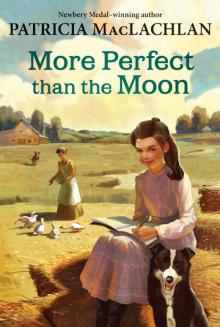 More Perfect Than the Moon
More Perfect Than the Moon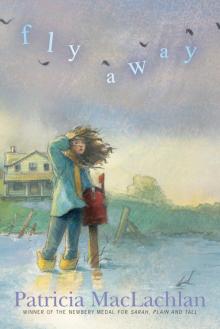 Fly Away
Fly Away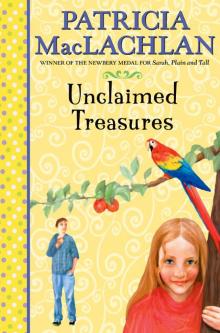 Unclaimed Treasures
Unclaimed Treasures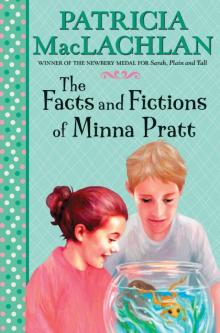 The Facts and Fictions of Minna Pratt
The Facts and Fictions of Minna Pratt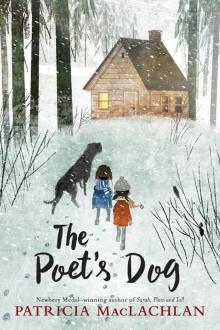 The Poet's Dog
The Poet's Dog Journey
Journey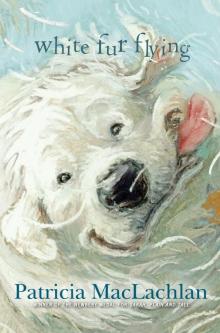 White Fur Flying
White Fur Flying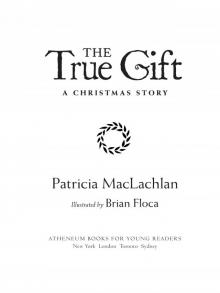 The True Gift: A Christmas Story
The True Gift: A Christmas Story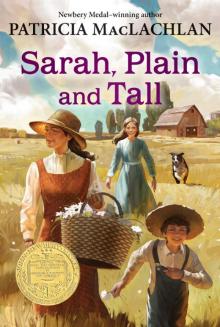 Sarah, Plain and Tall
Sarah, Plain and Tall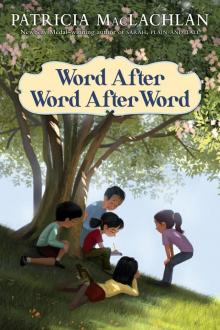 Word After Word After Word
Word After Word After Word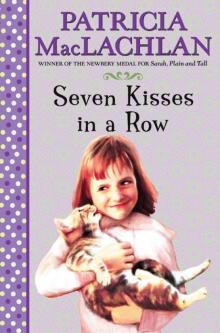 Seven Kisses in a Row
Seven Kisses in a Row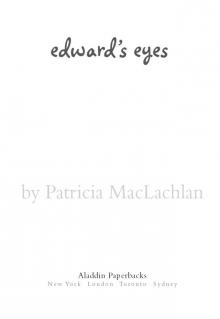 Edward's Eyes
Edward's Eyes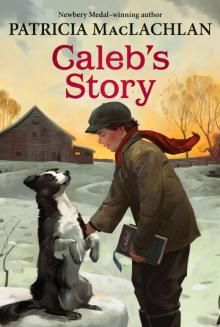 Caleb's Story
Caleb's Story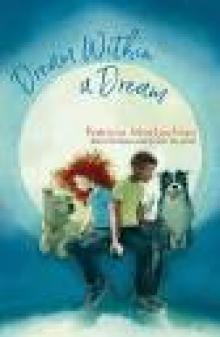 Dream Within a Dream
Dream Within a Dream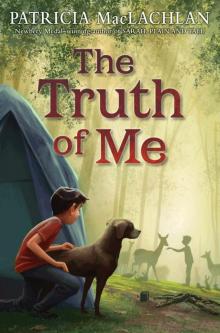 The Truth of Me
The Truth of Me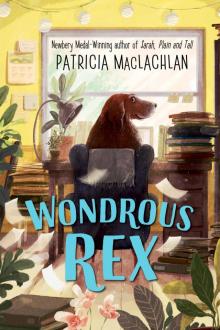 Wondrous Rex
Wondrous Rex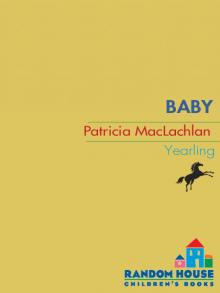 Baby
Baby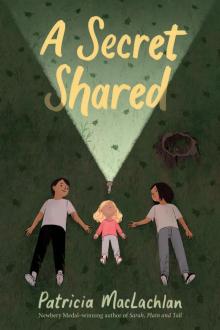 A Secret Shared
A Secret Shared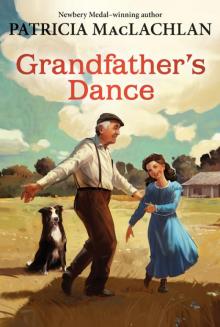 Grandfather's Dance
Grandfather's Dance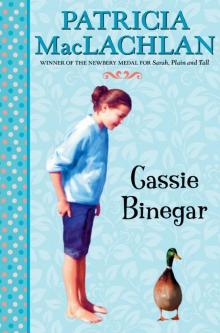 Cassie Binegar
Cassie Binegar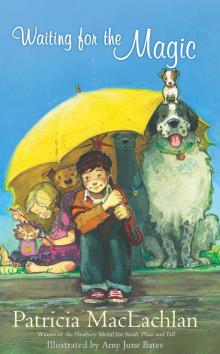 Waiting for the Magic
Waiting for the Magic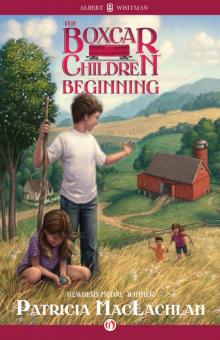 The Boxcar Children Beginning
The Boxcar Children Beginning My Father's Words
My Father's Words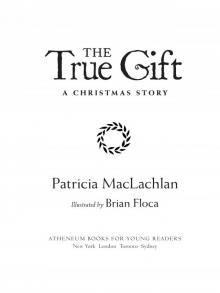 The True Gift
The True Gift